Roman Empire Slaves in Literary and Administrative Roles, and its Correlation with Identity
DOI:
https://doi.org/10.29173/crossings379Keywords:
Identity, Literary and Administrative Labour, Marcus Tullius Cicero, Manumission, Pliny the Elder, Roman SlaveryAbstract
While slavery was not a foreign concept to many ancient societies, the Roman Empire was unique in the types of roles slaves were involved in. While most, if not all, slaves were involved in laborious work of some sort, a topic of interest is slaves in urban settings who did administrative and literary work for their owners. The type of work that is of interest is those slaves who were copyists, amanuenses, readers, and writersa. With these types of jobs in mind, I examined how the slaves’ involvement in these roles would have contributed to their identity as slaves. Consequently, there is also the converse side of the analysis that examines how slave owners would have formed their elite identity by tasking their slaves with these duties. Specifically, I surveyed two cases of slave owners who engaged their slaves in literary and administrative work: Pliny the Elder and the hundreds of slaves he owned, and Marcus Tullius Cicero and his slave Tiro. Through these two contrasting accounts of aristocratic slave owners and their slaves who were involved in the administrative and literary work, I theorize about how both groups would have thought, or didn’t think, about their identity. Aspects of social hierarchy, physical labour of the body, and manumission are all discussed and considered.

Downloads
Published
Issue
Section
License
Copyright (c) 2025 Brooklyn Hollinger

This work is licensed under a Creative Commons Attribution 4.0 International License.

